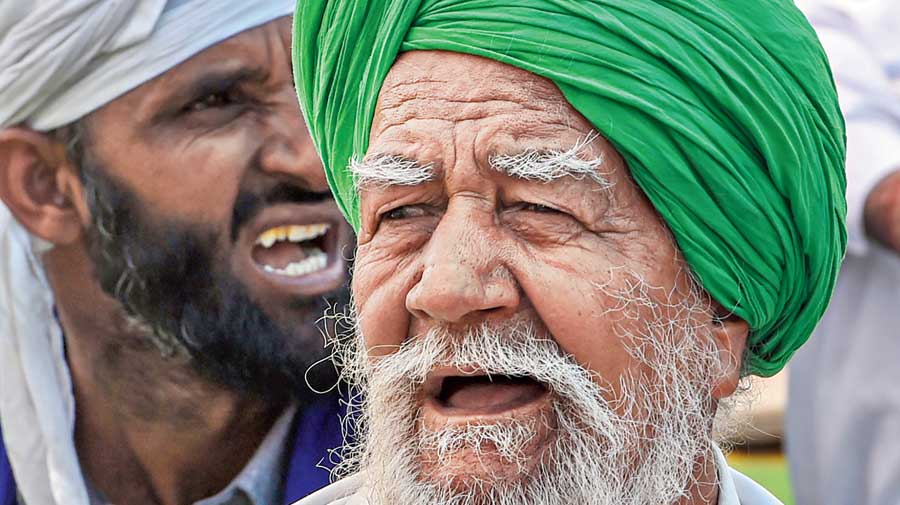A British non-profit that previously uncovered crimes against humanity in Myanmar as well as Chinese propaganda from fake social media handles has now exposed a coordinated plot to link India’s protesting farmers to Khalistanis through inauthentic social media posts.
The provocateurs have not been identified but what links the fake handles is propaganda that supports the Indian government’s narrative on the farmer agitation, separatism in Punjab and the glorification of Indian troops.
The report titled “Analysis of the #RealSikh Influence Operation”, published online by the Centre for Information Resilience (CIR), found a network of 80 fake social media accounts conducting the propaganda.
“In the content produced by the fake network, many of the memes and text are promoting the narrative that the Khalistani movement was ‘trying to hijack the farmers protest’ which is an attempt to delegitimise the farmers movement and shift the debate away from the farmer laws and into what the accounts claim is an issue about ‘terrorism’ and ‘Khalistan’….
“The fake accounts do not show signs of automation, but rather appear to be human-operated, acting as ‘sock puppet’ accounts with the same personas replicated over multiple platforms and repeating the same content,” the report says.
The report said there was a “coordinated influence operation” on Twitter, Facebook and Instagram using fake personas acting as influencers within the Sikh community to discredit the farmer movement.
In a section titled “Implications for India’s political and social cohesion”, the report says: “Continuation or expansion of the network’s activity therefore risks reducing cohesion within the Sikh community, weakening trust and understanding between India’s different religious communities, and increasing social divisions that could undermine the stability of one of the world’s largest and most diverse democracies.
“The network’s advocacy that supporters of Sikh independence are extremist or terrorist, and that Indian nationalists must take action against them, may contribute to an environment in which some actors consider intimidation of, or violence towards, the Sikh community as legitimate.”
Several BJP politicians, including ministers, at the Centre and in the states too have described the farmers opposing the three new farm laws as Khalistani terrorists and Maoists backed by Pakistan and China.
The Union ministry of home affairs and that of electronics and information technology are yet to respond to queries from this newspaper on whether any action would be taken on the findings.
Earlier this year, Twitter had revealed that a quarter of all the requests it received from public authorities to remove content came from India. In the past, similar probes by foreign and Indian groups have put the Indian government under the scanner for allegedly backing disinformation campaigns from inauthentic entities to counter Pakistan and promote its own narrative on world affairs.
Campaigns from fake Facebook and Twitter handles were exposed also during the 2019 parliamentary polls.
CIR said that Twitter and Meta — which runs Facebook and Instagram — had suspended fake accounts it had reported to them.
A Meta spokesperson told The Telegraph: “We removed these accounts for violating our inauthentic behaviour policies. They misled people about the origin and popularity of their content and used fake accounts to spam people and evade our enforcement.”
However, neither Meta nor Twitter responded to this newspaper’s question whether the source of the disinformation had been identified.
The Samyukta Kisan Morcha, which has been leading the farmers’ movement, responded to the revelations saying it was “concerned about the divisive agenda being promoted in this manner, and asks citizens to be extra alert about this virtual strategy to pit citizens against each other”.
“The BJP and its supporters have not hesitated to use various strategies to attack the peaceful movement, even as the government went out of its way to suspend and stop the accounts of supporters of the protesting farmers,” the Morcha said.
The online campaign seems to have had a degree of success.
Ravinder Singh, CEO of Khalsa Aid, an international non-profit that supports victims of natural and man-made disasters, tweeted: “Most of the FAKE accounts are so obvious and yet our own genuine guys join them to attack fellow Sikh activists!!”
The CIR added: “The core of the network are accounts positioning themselves as true Sikhs, whilst their content is amplified by accounts self-identifying as Indian nationalists. This suggests the influence operation may be targeting audiences within both Sikh and Hindu communities. The profiles of the fake accounts, their adoption of common Sikh names, their use of similar if not identical spam hashtags and content, and our analysis of their interactions with other Twitter users, suggests their activity is coordinated.”
Among the hashtags used were #Khalistanis, #RealSikhsAgainstKhalistan, #SikhsRejectKhalistan and #ShameOnKhalistanis. The fake accounts used several images of Punjabi celebrities and even a Pakistani celebrity.
The researchers observed little content in Punjabi. “This may either be due to the targeted audience of the network being non-language specific (using English rather than specifically Punjabi or Hindi), or because the people operating the Sikh influencer accounts are not able to write sufficient text in Punjabi,” they said.
Food policy analyst Devinder Sharma tweeted: “Suspending these fake accounts is no solution. They need to be apprehended and punished.”











